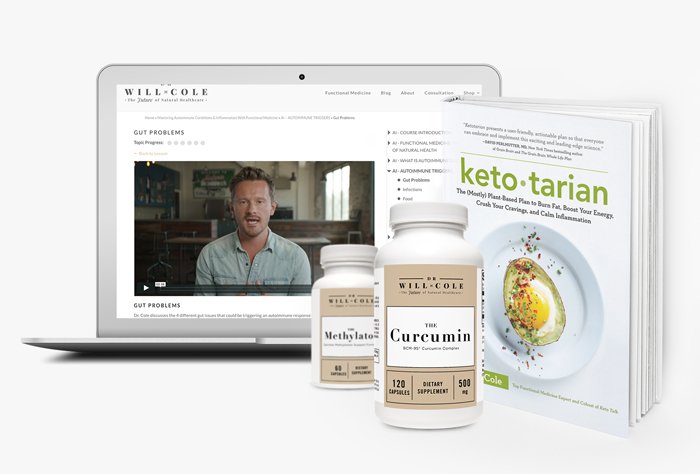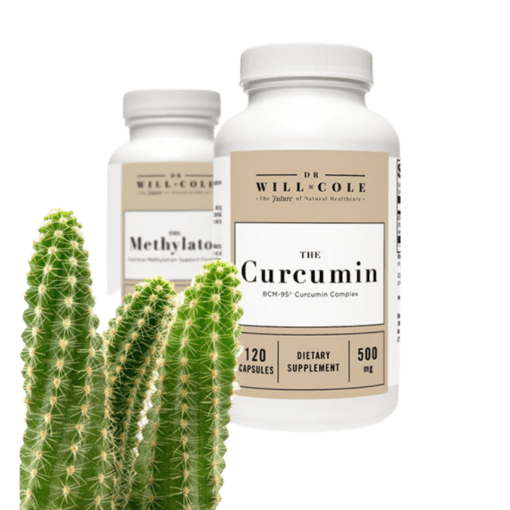Everything You Need To Know About Fat-Soluble & Water-Soluble Vitamins

When a patient walks through the doors of my functional medicine center, I know that I am looking at someone who already has sifted through the vastness of wellness information that is available at our fingertips. Most likely they are already well versed about supplements, lab testing, and know quite a bit about how to live healthfully. In spite of the abundant information available and their best efforts, they are still struggling with health issues. Taking their wellness journey to the next level, and optimizing their current plan and practices is my work. I join them on the journey to solving their health puzzle.
Almost all of my patients also carry some baggage, a “supplement graveyard” of sorts. Perhaps you have one in your home. A cabinet, shelf, or bin, filled to the brim with vitamins, powders, and potions. Half used, some forgotten after patients take one for a few weeks and then move on to the next. What do these supplements do and how can you know if what you are taking is effective for you?
One important difference between certain supplements is whether the vitamins are water-soluble or fat-soluble. Let’s begin there.
Article continues below
Make Your Life a Cleanse
SUBSCRIBER-ONLY GUIDES FOR GUT HEALTH, VIBRANT ENERGY, HEALTHY FOOD & CLEAN ALCOHOL
Get FREE access to these + giveaways, recipes, & discount codes in personal emails from Dr. Will Cole.
The water-soluble vitamins
Water-soluble vitamins are naturally found in food and in the water that resides in a food. The body does not typically store these vitamins, and so we need to get them regularly from the foods that we eat and supplementation if necessary. Unlike their fat-soluble counterparts, if they’re not used up by the body, they are simply excreted through urine. This means that water-soluble toxicity is uncommon.
1. B vitamins
Meet the vitamins in the B-complex family:
This grouping of vitamins consists of eight compounds with similar health benefits and functions. They are often found in the same foods.
- B1 (Thiamine)
- B2 (Riboflavin)
- B3 (Niacin)
- B5 (Pantothenic acid)
- B6 (Pyridoxine)
- B7 (Biotin)
- B9 (Folate)
- B12 (Cobalamin)
Apart from absorbing B vitamins from food, some Bs are made by our healthy gut bacteria! B2, B5, B6, B7, B9, and B12 can all be made by the microbiome. Another reason to support a healthy gut!
Why you need B vitamins:
- Boosted metabolism (1)
- Optimal brain function and protection from brain issues (2)
- To make neurotransmitters (3) like GABA and acetylcholine
- Healthy skin, hair, and nails
- Production of powerful (3) antioxidants like glutathione
- Healthy stress response (4) and brain-adrenal axis
- Heart-health support (5)
- Accelerate healing (6) after injury
- Decrease (7) arterial plaque
- Mitochondrial health (8)
- Decrease pro-inflammatory bad guys (9) like interleukin-6 and TNF-α
- Decrease oxidation (3)
- Protective myelin sheath (10) for your neurological system
Fortunately many foods naturally contain B vitamins, including:
- Meat (organ meats like liver are the highest sources; red meat is the second richest)
- Nuts
- Avocados
- Egg yolks
- Seafood (fatty fish like salmon and mackerel as well as shellfish)
- Seeds
- Green leafy vegetables (like spinach)
- Sulfur-rich vegetables (like cabbage)
- Yogurt
2. Vitamin C
Vitamin C is a well-known supplement as many people commonly increase their daily vitamin C to ward off illness. Here’s more reasons why vitamin C is so important:
- Production and repair (3) of tendons, ligaments, bones, and teeth
- Healthy skin and collagen production (11)
- Potent antioxidant power, (12) which is needed for a healthy immune system
You can supplement with vitamin C, but there are a ton of foods that also contain a bunch of this healthy nutrient:
- Citrus fruits (oranges, lemons, limes, and grapefruit)
- Broccoli
- Peppers
- Leafy green vegetables
- Strawberries
- Kiwifruit
- Papayas
- Cantaloupes
- Organ meats
The fat-soluble vitamins
The modern “reduced fat” diet leads to a deficit of fat-soluble vitamins and their benefits. Vitally important for immune, hormone, and brain health, fat-soluble vitamins are dissolved in fat and must be paired with healthy fats to be bioavailable. Because the body stores unused fat-soluble vitamins instead of releasing them in urine, these vitamins can be toxic if taken in excess.
1. Vitamin A
Vitamin A equips the body with a strong immune system. (13) Deficiency in vitamin A has been linked to inflammatory conditions such as rheumatoid arthritis and type 1 diabetes. Why? Researchers seem to think (14) this has to do with our dendritic cells. These cells are the alarms of the immune system, and send out the messages the signal that are stimulating or calming. The calming response needs vitamin A to operate optimally. Vitamin A can be found in the following foods:
- fish
- shellfish
- cod liver oil
- liver
- butter or ghee
Why are there no plant sources listed above? Plant carotenes, a precursor to vitamin A, are found in sweet potatoes and carrots, but the conversion rate to the usable form of vitamin A (retinol) is very weak. Research suggests that just 3 percent of beta-carotenes (15) are converted in a healthy adult.
2. Vitamin D
Known as the “sunshine vitamin,” this nutrient is essential for metabolic and immunological pathways in the body. For example, Th17 cells are helper T-cells that produce several inflammatory chemicals, such as interleukin-17. With autoimmune conditions—such as inflammatory bowel disease, multiple sclerosis, psoriasis, and rheumatoid arthritis—Th17 cells are often at high levels. Vitamin D, in conjunction with vitamin A, works to synergistically dampen the Th17 inflammatory response.
As with vitamin A, vitamin D is most abundant in animal and dairy fats like:
- mackerel
- oysters
- sardines
- egg yolks
However, soaking up some sun is one of the best ways to boost your vitamin D. Aim for about 20 to 60 minutes a day, depending on your complexion. Also think about testing your vitamin D levels every few months to ensure a healthy level
3. Vitamin E
Vitamin E refers to a combination of nutrients known as tocopherols. While alpha-tocopherol seems to be the most bioavailable, beta-tocopherol, gamma-tocopherol, and delta-tocopherol all work synergistically in foods and in your body. Vitamin E is a potent antioxidant essential to calming inflammation and supporting healthy and balanced hormonal and immune systems. Find Vitamin D naturally in:
- raw almonds
- raw hazelnuts
- wild salmon
- palm kernel oil
- flaxseed oil
4. Vitamin K2
K2 is a predominant nutrient deficiency in our modern diets. Studies have found (16) that vitamin K2 effectively inhibited the pro-inflammatory iNOS in the spinal cord and brain immune systems in rats that were showing symptoms of multiple sclerosis. K2 is best paired with the other fat-soluble vitamins, A and D, in whole food form like grass fed butter oil (ghee) or organ meat. Natto, a Japanese superfood made from non-GMO fermented soybeans is also high in levels of K2. Dandelion greens, raw Swiss chard, and cooked kale all contain vitamin K1 which is converted to K2 in a healthy gut microbiome. Gut bacterial for the win again!
In any discussion about supplements and vitamins, it is imperative to remember that real food comes first. One cannot supplement out of a poor, nutrient deficient diet. While supplements can help, they cannot mimic how nutrients in real food act in our bodies. Nutrient magic never will come from a pill or a dropper. However, our food supply no longer contains the nutrients that it had in times past so it is vital to balance and tailor a plan to your body. It is wise to get lab work done before starting a supplement regimen, so your supplement plan that will be as targeted as possible.
As one of the first functional medicine telehealth clinics in the world, we provide webcam health consultations for people around the globe.
Photo: Stocksy
Start Your Health Journey Today
FUNCTIONAL MEDICINE CONSULTATIONS FOR PEOPLE AROUND THE WORLD
References:
- Guilland JC. Vitamine B1 (thiamine) [Vitamin B1 (thiamine)]. Rev Prat. 2013;63(8):1074‐1078.
- Reynolds E. Vitamin B12, folic acid, and the nervous system. Lancet Neurol. 2006;5(11):949‐960. doi:10.1016/S1474-4422(06)70598-1
- Chawla J, Kvarnberg D. Hydrosoluble vitamins. Handb Clin Neurol. 2014;120:891‐914. doi:10.1016/B978-0-7020-4087-0.00059-0
- Kelly GS. Nutritional and botanical interventions to assist with the adaptation to stress. Altern Med Rev. 1999;4(4):249‐265.
- Ahmed M, Azizi-Namini P, Yan AT, Keith M. Thiamin deficiency and heart failure: the current knowledge and gaps in literature. Heart Fail Rev. 2015;20(1):1‐11. doi:10.1007/s10741-014-9432-0
- M Aprahamian, A Dentinger, C Stock-Damgé, J C Kouassi, J F Grenier, Effects of supplemental pantothenic acid on wound healing: experimental study in rabbit, The American Journal of Clinical Nutrition, Volume 41, Issue 3, March 1985, Pages 578–589, https://doi.org/10.1093/ajcn/41.3.578
- Lipszyc PS, Cremaschi GA, Zorrilla-Zubilete M, et al. Niacin Modulates Pro-inflammatory Cytokine Secretion. A Potential Mechanism Involved in its Anti-atherosclerotic Effect. Open Cardiovasc Med J. 2013;7:90‐98. Published 2013 Sep 20. doi:10.2174/1874192401307010090
- Jhala SS, Wang D, Hazell AS. Thiamine deficiency results in release of soluble factors that disrupt mitochondrial membrane potential and downregulate the glutamate transporter splice-variant GLT-1b in cultured astrocytes. Biochem Biophys Res Commun. 2014;448(3):335‐341. doi:10.1016/j.bbrc.2014.04.017
- Si Y, Zhang Y, Zhao J, et al. Niacin inhibits vascular inflammation via downregulating nuclear transcription factor-κB signaling pathway. Mediators Inflamm. 2014;2014:263786. doi:10.1155/2014/263786
- Peter R. Martin, M.D., Charles K. Singleton, Ph.D., and Susanne Hiller–Sturmhöfel, Ph.D. The Role of Thiamine Deficiency in Alcoholic Brain Disease Alcohol Research & Health 2003;27(2): 134-42. https://pubs.niaaa.nih.gov/publications/arh27-2/134-142.htm
- Boyera N, Galey I, Bernard BA. Effect of vitamin C and its derivatives on collagen synthesis and cross-linking by normal human fibroblasts. Int J Cosmet Sci. 1998;20(3):151‐158. doi:10.1046/j.1467-2494.1998.171747.x
- Anitra C Carr, Balz Frei, Toward a new recommended dietary allowance for vitamin C based on antioxidant and health effects in humans, The American Journal of Clinical Nutrition, Volume 69, Issue 6, June 1999, Pages 1086–1107, https://doi.org/10.1093/ajcn/69.6.1086
- Ikeda U, Wakita D, Ohkuri T, et al. 1α,25-Dihydroxyvitamin D3 and all-trans retinoic acid synergistically inhibit the differentiation and expansion of Th17 cells. Immunol Lett. 2010;134(1):7‐16. doi:10.1016/j.imlet.2010.07.002
- Manicassamy S, Ravindran R, Deng J, et al. Toll-like receptor 2-dependent induction of vitamin A-metabolizing enzymes in dendritic cells promotes T regulatory responses and inhibits autoimmunity. Nat Med. 2009;15(4):401‐409. doi:10.1038/nm.1925
- Hedrén E, Diaz V, Svanberg U. Estimation of carotenoid accessibility from carrots determined by an in vitro digestion method. Eur J Clin Nutr. 2002;56(5):425‐430. doi:10.1038/sj.ejcn.1601329
- Moriya M, Nakatsuji Y, Okuno T, Hamasaki T, Sawada M, Sakoda S. Vitamin K2 ameliorates experimental autoimmune encephalomyelitis in Lewis rats. J Neuroimmunol. 2005;170(1-2):11‐20. doi:10.1016/j.jneuroim.2005.08.001
View More At Our Store
Purchase personally curated supplements
and Dr. Will Cole’s books!

The information on this website has not been evaluated by the Food & Drug Administration or any other medical body. We do not aim to diagnose, treat, cure or prevent any illness or disease. Information is shared for educational purposes only. You must consult your doctor before acting on any content on this website, especially if you are pregnant, nursing, taking medication, or have a medical condition.
Our articles may include products that have been independently chosen and recommended by Dr. Will Cole and our editors. If you purchase something mentioned in this article, we may earn a small commission.

BY DR. WILL COLE
Dr. Will Cole, DNM, IFMCP, DC is a leading functional medicine expert who consults people around the globe, starting one of the first functional medicine telehealth centers in the world. Named one of the top 50 functional and integrative doctors in the nation, Dr. Will Cole provides a functional medicine approach for thyroid issues, autoimmune conditions, hormonal imbalances, digestive disorders, and brain problems. He is also the host of the popular The Art of Being Well podcast and the New York Times bestselling author of Intuitive Fasting, Ketotarian, Gut Feelings, and The Inflammation Spectrum.

Gut Feelings
Healing The Shame-Fueled Relationship
Between What You Eat And How You Feel

